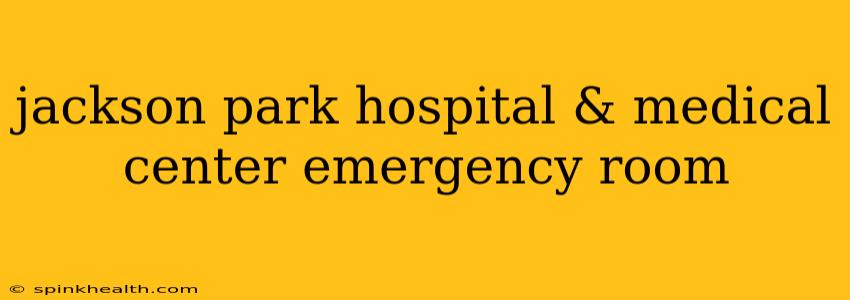Jackson Park Hospital & Medical Center's Emergency Room (ER) plays a vital role in the South Side Chicago community, providing critical care for a wide range of medical emergencies. But navigating a hospital ER can be stressful, especially during a medical crisis. This guide aims to equip you with the information you need to approach your visit to the Jackson Park Hospital ER with confidence and understanding.
Imagine this: It's late at night, and a sudden illness or injury strikes. You find yourself rushing to the nearest ER – Jackson Park Hospital. The flashing lights, bustling staff, and unfamiliar environment can be overwhelming. Knowing what to expect can ease your anxiety and ensure you receive the best possible care.
What Types of Emergencies Does Jackson Park Hospital ER Handle?
Jackson Park Hospital's ER is equipped to handle a broad spectrum of medical emergencies, including but not limited to:
- Trauma: Severe injuries resulting from accidents, falls, or violence.
- Cardiac Emergencies: Heart attacks, chest pain, and irregular heartbeats.
- Stroke: Sudden weakness or numbness in the face, arm, or leg.
- Respiratory Distress: Difficulty breathing, shortness of breath.
- Severe Allergic Reactions: Anaphylaxis, hives, swelling.
- Seizures: Unexplained convulsions or loss of consciousness.
- Severe Infections: Sepsis, meningitis.
- Severe Bleeding: Uncontrolled bleeding that doesn't stop with direct pressure.
What Should I Bring to the Jackson Park Hospital ER?
Preparing beforehand, even during a stressful situation, can streamline the process:
- Insurance Information: Your insurance card will help expedite billing.
- Photo ID: A driver's license or other form of identification is essential.
- List of Medications: Including dosages and frequencies. This is crucial for accurate treatment.
- Advance Directives (if applicable): Documents outlining your wishes regarding medical care.
- Emergency Contact Information: A list of people to contact.
How Long is the Typical Wait Time at Jackson Park Hospital ER?
Wait times at any ER can vary greatly depending on the number of patients, the severity of their conditions, and the availability of staff. While it's impossible to give a precise estimate, be prepared for potential delays. The hospital prioritizes patients based on the urgency of their medical needs, a system known as triage.
What is the Triage Process at Jackson Park Hospital ER?
Upon arrival, a triage nurse will assess your condition to determine the urgency of your needs. This process is designed to ensure that patients with the most critical conditions receive immediate attention. Be patient and cooperative during this assessment.
Does Jackson Park Hospital ER Accept All Insurance Plans?
It's best to contact Jackson Park Hospital directly to confirm which insurance plans they accept. Their website or billing department should have the most up-to-date information.
What are the Visiting Hours at Jackson Park Hospital?
Visiting hours for the ER might differ from those of the general hospital wards. It is advisable to inquire about the visiting policies directly with the hospital administration.
What are my payment options at Jackson Park Hospital ER?
Jackson Park Hospital likely offers various payment options including cash, credit cards, and possibly payment plans. Details regarding specific payment methods are best obtained directly from the hospital's billing department.
Conclusion
While facing a medical emergency is undeniably stressful, understanding the processes and expectations of Jackson Park Hospital & Medical Center's ER can make a significant difference. Remember to prioritize your safety, gather necessary information, and communicate clearly with medical staff. By being prepared and informed, you can navigate this challenging experience with greater confidence and receive the best possible care. Remember to always call 911 for life-threatening emergencies.

